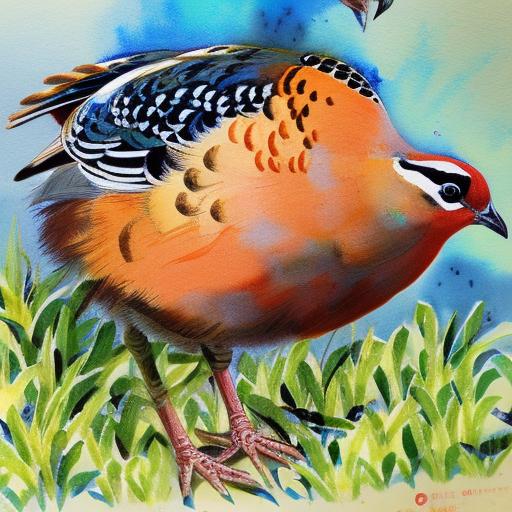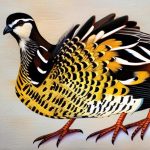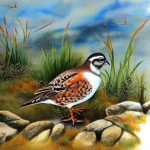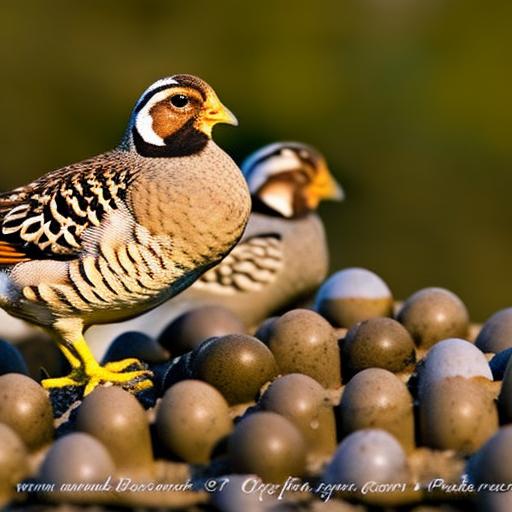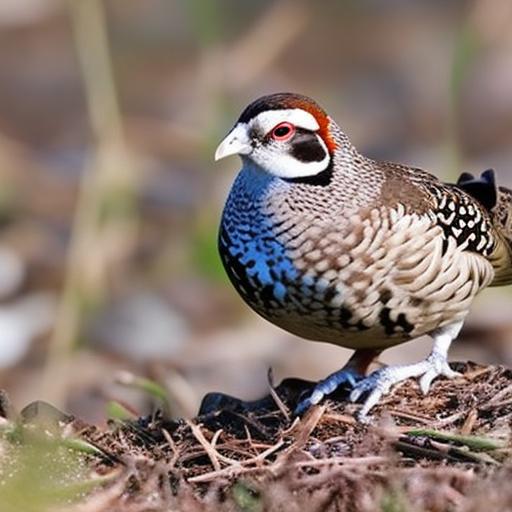King quails, also known as button quails, are small, ground-dwelling birds that are native to Australia and surrounding regions. They are popular among bird enthusiasts for their small size, colorful plumage, and interesting behaviors. King quails are known for their distinctive call, which sounds like a series of whistles or chirps. They are also known for their ability to fly short distances, making them a unique addition to any aviary or backyard flock.
These birds are typically around 4-5 inches in length and come in a variety of colors, including brown, silver, and cinnamon. They are known for their social nature and can often be found in small flocks in the wild. In captivity, they thrive in pairs or small groups, and they are relatively easy to care for. King quails are ground-dwelling birds, so they require a habitat with plenty of space to roam and forage. They are also known for their ability to lay a large number of eggs, making them a popular choice for breeders. Overall, king quails are fascinating birds that can make a delightful addition to any bird enthusiast’s collection.
Key Takeaways
- King quails are small, ground-dwelling birds native to Australia and are popular for their colorful plumage and pleasant nature.
- When selecting breeding stock, look for healthy birds with vibrant plumage and active behavior to ensure successful breeding.
- Creating the right environment for breeding includes providing a spacious and secure enclosure with proper nesting materials and a balanced diet.
- The breeding process involves introducing the male and female quails, monitoring their behavior, and providing a suitable nesting area for egg laying.
- Caring for the eggs involves maintaining proper temperature and humidity levels, regularly turning the eggs, and ensuring a clean and safe environment.
- Raising the chicks requires providing a warm and safe brooding area, offering a balanced diet, and monitoring their growth and development.
- Common issues in breeding king quails include egg infertility, egg binding, and chick mortality, which can be addressed through proper nutrition and veterinary care.
Selecting Breeding Stock
When it comes to breeding king quails, selecting the right breeding stock is crucial for success. It’s important to choose healthy, vibrant birds with good genetics to ensure the best possible offspring. Look for birds that are active, alert, and free from any signs of illness or injury. It’s also important to select birds with desirable traits, such as vibrant plumage and strong, well-proportioned bodies.
When selecting breeding stock, it’s also important to consider the birds’ lineage and genetic history. Look for birds with a strong pedigree and good breeding records to increase the likelihood of producing healthy, high-quality offspring. Additionally, it’s important to consider the birds’ compatibility and temperament when selecting breeding stock. Choose birds that get along well and exhibit natural mating behaviors to ensure successful breeding. By carefully selecting breeding stock with good genetics, health, and compatibility, you can set the stage for a successful breeding program and produce high-quality king quails.
Creating the Right Environment
Creating the right environment for breeding king quails is essential for their health and well-being. King quails require a spacious and secure habitat that mimics their natural environment. A large aviary or outdoor enclosure with plenty of room to roam and forage is ideal for breeding king quails. The habitat should also include plenty of hiding spots, such as dense vegetation or shelters, to provide the birds with a sense of security.
In addition to space and shelter, the habitat should also include appropriate substrate for nesting and foraging. A mixture of sand and soil can provide an ideal substrate for king quails to build their nests and forage for food. It’s also important to provide a variety of perches and branches for the birds to roost and exercise. Additionally, the habitat should include access to fresh water and a balanced diet of seeds, insects, and greens to ensure the birds’ nutritional needs are met.
Finally, it’s important to consider the temperature and lighting in the habitat. King quails thrive in moderate temperatures between 60-80 degrees Fahrenheit and require access to natural sunlight or full-spectrum lighting for optimal health. By creating a spacious, secure habitat with appropriate substrate, shelter, perches, and nutrition, you can provide the ideal environment for breeding king quails.
Breeding Process
The breeding process for king quails begins with introducing compatible pairs into a suitable breeding environment. Once the birds have acclimated to their new surroundings, they will begin exhibiting natural mating behaviors, such as courtship displays and vocalizations. Male king quails will often puff up their feathers and perform elaborate dances to attract females, while females may respond with calls and submissive behaviors.
Once the birds have formed a strong bond and established a mating pair, the female will begin laying eggs in a carefully constructed nest on the substrate. King quails are prolific egg layers, with females laying up to 10-12 eggs in a single clutch. The eggs are typically small and speckled in appearance, and they require an incubation period of around 16-18 days before hatching.
During the breeding process, it’s important to monitor the birds closely for any signs of aggression or stress. Provide plenty of privacy and minimize disturbances to ensure the birds feel secure during the breeding process. By observing natural mating behaviors and providing a stress-free environment, you can support successful breeding and egg laying in king quails.
Caring for the Eggs
Caring for king quail eggs is essential for ensuring successful hatching and healthy chicks. Once the female has laid her eggs, it’s important to provide a warm, stable environment for incubation. You can use an artificial incubator or allow the female to incubate the eggs herself, depending on your preference and resources. Maintain a consistent temperature of around 99-100 degrees Fahrenheit and keep the humidity levels between 40-50% throughout the incubation period.
It’s important to monitor the eggs closely for any signs of damage or contamination during incubation. Remove any cracked or soiled eggs to prevent the spread of bacteria and ensure the remaining eggs have the best chance of hatching successfully. Additionally, it’s important to turn the eggs several times a day to prevent the embryos from sticking to the shell membrane.
As the incubation period progresses, you may notice signs of development within the eggs, such as movement or chirping from the embryos. This is an exciting indication that hatching is imminent! As the eggs begin to hatch, it’s important to provide a warm, safe environment for the newly hatched chicks. Ensure they have access to food and water and monitor their health closely during this critical stage of development.
Raising the Chicks

Raising king quail chicks requires careful attention to their nutritional needs and development. Once the chicks have hatched, provide them with a warm brooder environment with access to food and water. You can use a commercial chick starter feed or finely ground seeds as a nutritious diet for the growing chicks. It’s important to monitor their growth and development closely and provide any necessary support or intervention as needed.
As the chicks grow, you can gradually introduce them to larger enclosures with access to natural substrate and perches. Provide plenty of opportunities for exercise and social interaction with other chicks or adult birds to support their physical and behavioral development. Additionally, it’s important to monitor their health closely for any signs of illness or injury and provide appropriate veterinary care as needed.
As the chicks mature, you may notice natural behaviors such as courtship displays and vocalizations as they reach sexual maturity. This is an exciting indication that your breeding program is successful! By providing a nurturing environment with appropriate nutrition, socialization, and healthcare, you can raise healthy king quail chicks that will thrive in your aviary or backyard flock.
Troubleshooting Common Issues
Breeding king quails can come with its own set of challenges and common issues that may arise during the process. One common issue is infertility in eggs or low hatch rates. This can be caused by factors such as poor genetics, inadequate nutrition, or improper incubation conditions. To address this issue, carefully select breeding stock with strong genetics and provide a balanced diet with appropriate nutrition for optimal egg production and fertility. Additionally, ensure that your incubation conditions are consistent and suitable for successful hatching.
Another common issue is aggression between mating pairs or adult birds towards chicks. This can be caused by territorial behavior or stress within the environment. To address this issue, provide plenty of space and hiding spots within the habitat to minimize aggression between birds. Additionally, monitor their behavior closely and intervene if necessary to prevent injury or stress.
Finally, another common issue is health problems in chicks or adult birds. This can be caused by factors such as poor nutrition, inadequate housing conditions, or exposure to pathogens. To address this issue, provide a balanced diet with appropriate nutrition, maintain a clean habitat with good ventilation, and monitor their health closely for any signs of illness or injury. Additionally, consult with a veterinarian experienced in avian care if you have concerns about your birds’ health.
By troubleshooting common issues with infertility, aggression, and health problems, you can support successful breeding and raise healthy king quails in your aviary or backyard flock.
If you’re interested in learning more about creating a suitable environment for your quails, you might also want to check out Poultry Wizard’s article on turning a shed into a chicken coop. This insightful piece offers valuable tips on repurposing existing structures to provide a comfortable and secure space for your birds. Whether you’re considering building a coop for your quails or chickens, this article provides practical advice that can help you create an ideal living space for your feathered friends. (source)
FAQs
What are some tips for breeding king quails?
Some tips for breeding king quails include providing a suitable breeding environment with proper nesting materials, ensuring a balanced diet with adequate protein and calcium, and maintaining a consistent lighting and temperature schedule.
How can I create a suitable breeding environment for king quails?
To create a suitable breeding environment for king quails, provide a spacious cage with nesting boxes or shelters, and add soft nesting materials such as hay or shredded paper. Ensure the environment is quiet and free from disturbances.
What should I feed my king quails for successful breeding?
For successful breeding, it is important to provide a balanced diet for king quails that includes a high-quality commercial quail feed supplemented with fresh greens, insects, and a source of calcium such as crushed eggshells.
What is the ideal lighting and temperature schedule for breeding king quails?
The ideal lighting schedule for breeding king quails is 14-16 hours of light per day, which can be achieved with a timer. The temperature should be maintained between 60-75°F (15-24°C) to encourage breeding behavior.
How can I encourage breeding behavior in king quails?
To encourage breeding behavior in king quails, provide a suitable breeding environment, ensure a balanced diet, maintain a consistent lighting and temperature schedule, and introduce a male and female pair of quails of breeding age.
Meet Walter, the feathered-friend fanatic of Florida! Nestled in the sunshine state, Walter struts through life with his feathered companions, clucking his way to happiness. With a coop that’s fancier than a five-star hotel, he’s the Don Juan of the chicken world. When he’s not teaching his hens to do the cha-cha, you’ll find him in a heated debate with his prized rooster, Sir Clucks-a-Lot. Walter’s poultry passion is no yolk; he’s the sunny-side-up guy you never knew you needed in your flock of friends!

